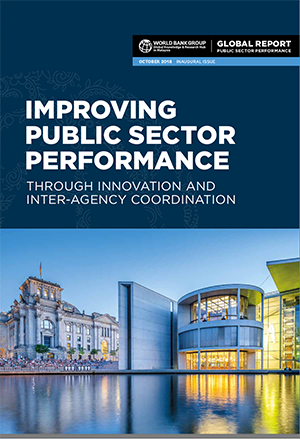
Updated: November 14, 2018
Others are learning from Serbian Experience: Courts Reward’s Program recognized as Innovation in Delivering of Justice Services
 Countries have experimented with many types of reforms to improve the efficiency and quality of justice services. To support countries to move further along the path of reform to achieve better public sector performance, including performance in the justice sector, the World Bank prepared the report Improving Public Sector Performance through Innovation and Inter-agency Coordination.
Countries have experimented with many types of reforms to improve the efficiency and quality of justice services. To support countries to move further along the path of reform to achieve better public sector performance, including performance in the justice sector, the World Bank prepared the report Improving Public Sector Performance through Innovation and Inter-agency Coordination.
The report aims to serve as a reference guide for all those involved in designing or implementing public sector reforms. The innovations in delivering justice services is one of the topics that Report addressed.
The experience amassed over the past decades of justice sector reform is highlighted in the cases from Serbia and Azerbaijan.
The report presented Serbian experience in incentivizing the best performing courts and consequently efficiency of the justice. Serbian experience shows the importance of identifying broader country incentives and aligning them with a tailor-made justice intervention to solve a persistent problem. While being responsive to citizens’ demands for faster justice, it centered on offering judges some positive competition and recognition for improving the efficiency of their work with increased management authority. Allowing presiding judges to organize their courts, assign workloads and implement mechanisms to reduce case backlogs validated their knowledge and capacities and placed them in the forefront of the reform.
Transparency, public communication, and outreach were also recognized as important complements that helped ensure buy-in, generate peer-pressure, and improve public perception, as well as recognition of those courts that improved their performance. These performance incentives were key to the success of the reform. Furthermore, this initiative benefited from the coordination and cooperation among the institutions representing the justice sector and the donor community.
Lesson learnt from Serbian experience is that countries keen to adopt reforms to address issues of efficiency, quality, and access need to generate consensus and engage the various actors and stakeholders to build momentum for the reform. In addition, it is recognized that the incentives served as a catalyst for managerial empowerment and change internally Serbian justice system. Reward’s Program is also apprised for offering an opportunity for the justice system to signal positive change to external audiences, and to reinvent itself in the eyes of citizens and businesses.
The report concluded that Serbian example confirmed that small incentives can go a long way and show what can be achieved to improve justice system performance on a broader scale.
 Countries have experimented with many types of reforms to improve the efficiency and quality of justice services. To support countries to move further along the path of reform to achieve better public sector performance, including performance in the justice sector, the World Bank prepared the report Improving Public Sector Performance through Innovation and Inter-agency Coordination.
Countries have experimented with many types of reforms to improve the efficiency and quality of justice services. To support countries to move further along the path of reform to achieve better public sector performance, including performance in the justice sector, the World Bank prepared the report Improving Public Sector Performance through Innovation and Inter-agency Coordination.